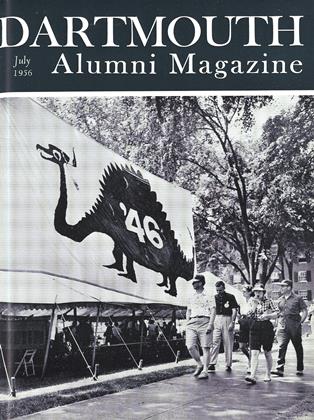By Charles Page Smith '40.Chapel Hill: University of North CarolinaPress, 1956. 426 pp. $7.50.
This is a biography of James Wilson, one of the Founding Fathers of the Republic who has been too long neglected by American historians.
James Wilson was born in Scotland and in his early twenties came to America. After two years as an apprentice in the law office of John Dickinson, he became actively engaged in the practice of law in Pennsylvania. The preRevolutionary agitation against Great Britain soon absorbed much of his time. Then came active service in the Continental Congress and finally his participation as a leading member in the Constitutional Convention. The last nine years of his life were devoted to the Supreme Court where he served as an Associate Justice.
Unquestionably, Wilson's greatest achievement during his active public career was his part in the establishment of the Federal Constitution of the United States in Philadelphia in 1787. He, with James Madison, Gouverneur Morris, and other leaders, framed a sound and lasting government for the new republic. "It was Wilson's vision," says the author, "more than that of any other single member of the Constitutional Convention, which was fulfilled in the next century and a half of American history."
There followed immediately the struggle for ratification of the Constitution in Wilson's home state of Pennsylvania. Again he threw his tremendous energy into the fight to gain support of the instrument he had done so much to frame. It was almost a personal triumph for Wilson when, as the leader in the contest for ratification, it was accepted by his own state.
During the Constitutional Convention, Wilson had been influential in molding the final conception of the Supreme Court. When the new government went into effect his greatest ambition was to serve as Chief Justice of this Court, and he went so far as to write President Washington to urge his own appointment to this high post. Even though he "ached to be chief justice," this goal was never to be achieved, and he had to content himself with the office of associate justice.
It is not generally known that James Wilson, who never did things by halves, was a reckless, land speculator almost from the day he landed in America. He ventured everything he had — and much more - in his great land gambles, because of his faith in the constantly growing economy of the United States. However, his financial collapse was not precipitated until the depression of 1796-97. At this time he was still an associate justice of the Supreme Court, and to avoid his creditors he went into hiding. The debtors' prison seemed to lie ahead. There was talk of impeachment, but Wilson clung to his place on the highest court of the land. "I have been hunted ... like a wild beast," he wrote. Wilson, broken physically, died in 1798 in a shabby Carolina inn, a fugitive from the law.
All in all, it is a fascinating and tragic story, extremely well told. It is hoped that Charles P. Smith, who is an assistant professor of . history in the University of California at Los Angeles, will now turn his able pen to other neglected figures in our early history.
 View Full Issue
View Full Issue
More From This Issue
-
 Feature
FeatureThe Honorary Degree Citations
July 1956 -
 Feature
FeatureThe 1956 Commencement
July 1956 By FRANK PEMBERTON -
 Feature
FeatureThe Fifty-Year Address
July 1956 By THURLOW M. GORDON '06 -
 Feature
FeatureGeorge Nickum '31 to Head Alumni Council for 1956-57
July 1956 -
 Feature
FeatureThe Seniors' Valedictory
July 1956 By WILLIAM FREDERICK BEHRENS '56 -
 Feature
FeatureThree Alumni Honored For Service to College
July 1956
Books
-
 Books
BooksALUMNI PUBLICATIONS
August 1924 -
 Books
BooksAlumni Publications
JANUARY, 1928 -
 Books
BooksDartmouth Lyrics
June 1924 By H. G. R. -
 Books
BooksJOYS AND SORROWS: REFLECTIONS
JULY 1970 By JON H. APPLETON -
 Books
BooksCRAZY WHITE MAN.
February 1953 By ROBERT MCKENNAN '25 -
 Books
BooksMAKE YOUR OWN MOVIES. (FOR FUN AND PROFIT).
June 1939 By S. C. H.

